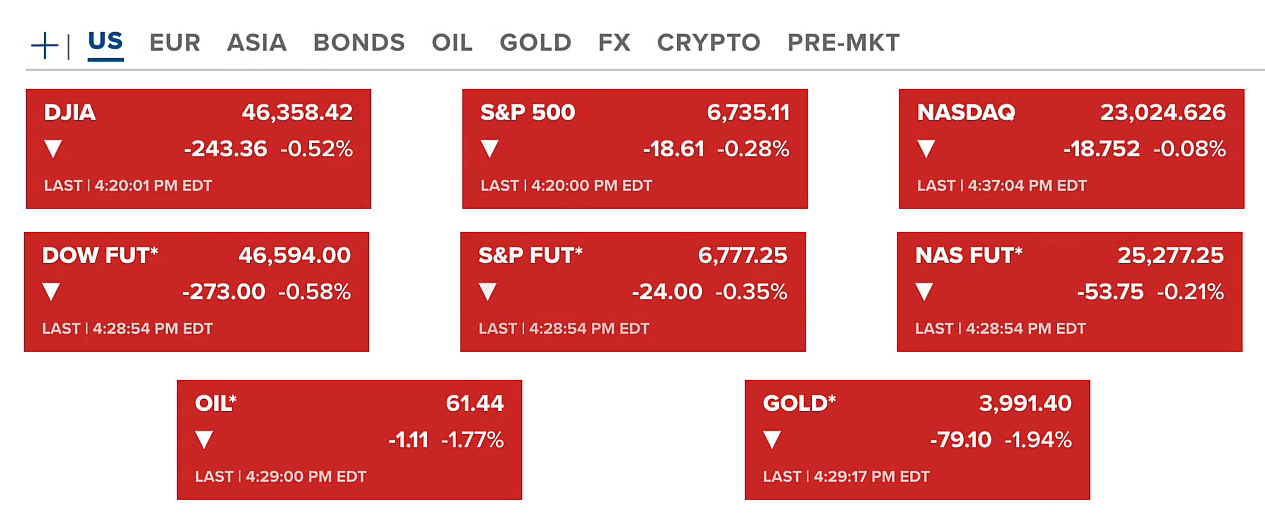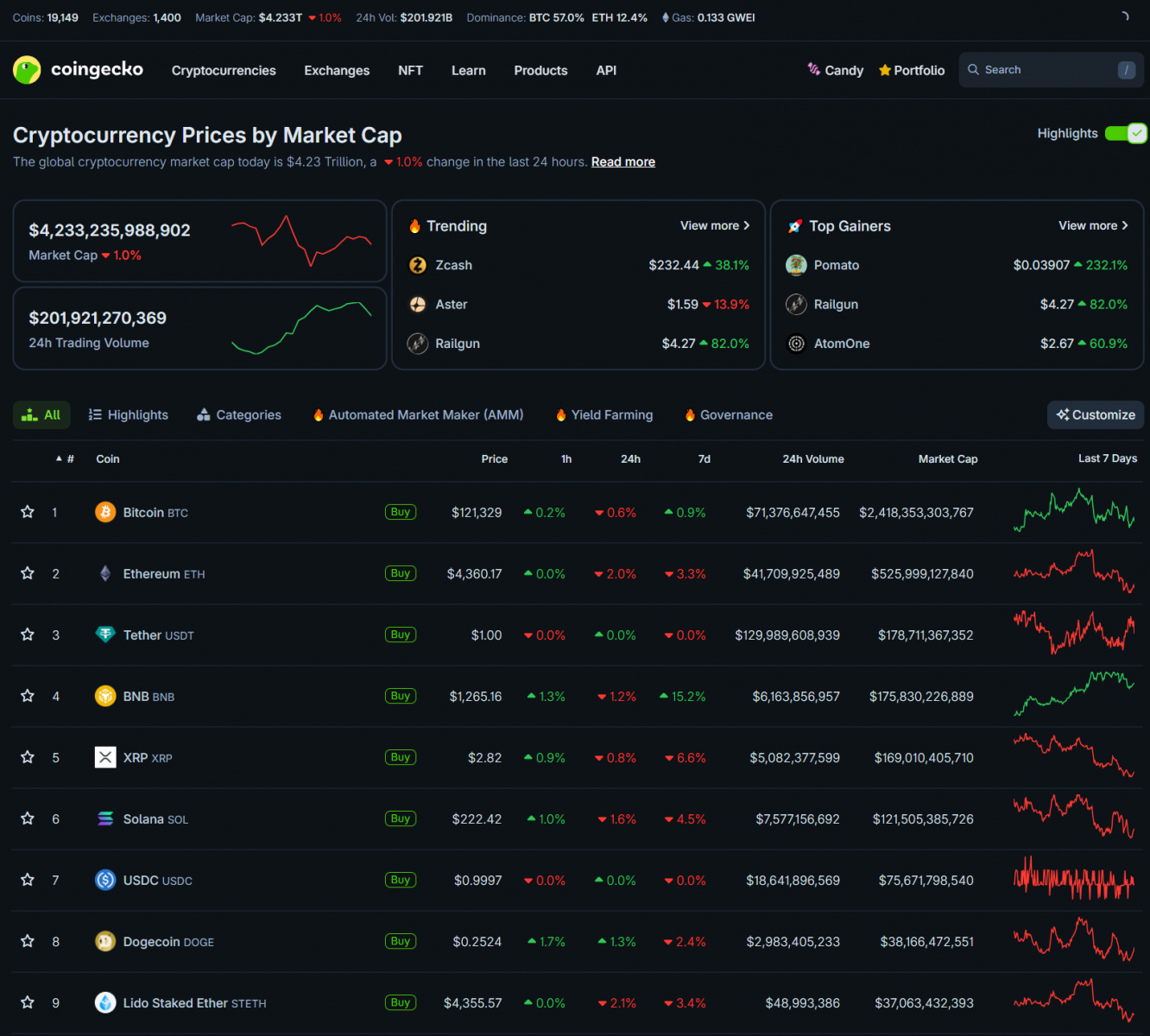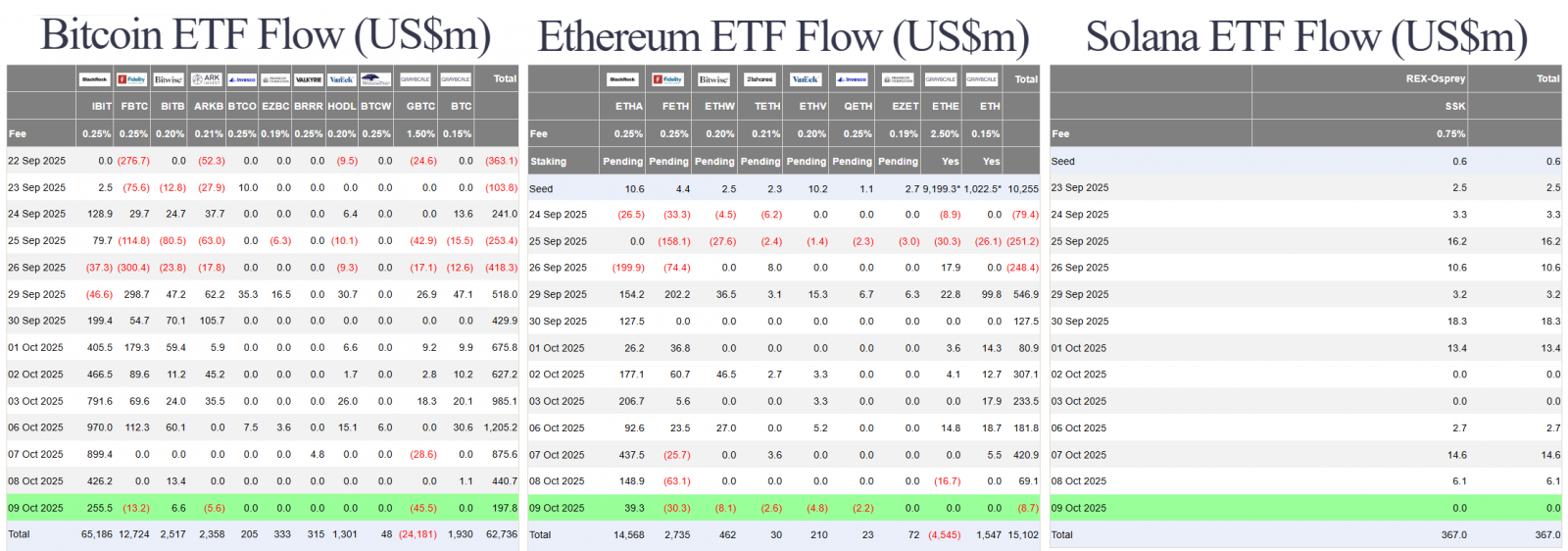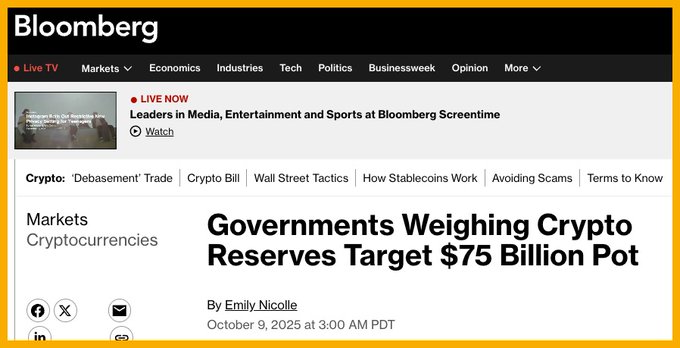Both the US stock and crypto markets declined in unison. Amidst this, the US government remains shut down, but positive news about BTC accumulation by institutions and governments continues to increase.
Market Overview
Institutional and ETF Flows
US equities closed lower across all three indices on Thursday (October 9th, US), with the Dow Jones dropping the most at 0.52%. Stock futures also continued to decline. Oil contracts fell to $61.4 per barrel. Gold corrected to $3991 per ounce after recently hitting a new peak.

The US Senate will hold a vote today to attempt to end the government shutdown. This is the seventh attempt, but negotiations between the two parties remain deadlocked. The US government continues its partial shutdown.
Bitcoin corrected to $121,000. Most major altcoins also saw declines. The overall crypto market capitalization fell to $4.23 trillion.

US BTC spot ETFs continued to see inflows but at a reduced pace compared to previous sessions, totaling $197.8 million. Conversely, ETH spot ETFs saw $8.7 million in outflows. SOL ETFs had a zero net flow.

Crypto ETFs in the US are constantly being updated. Recently, Bitwise updated its Solana ETF application, adding the word "Staking" to the fund name and setting the management fee at 0.20%. Numerous other proposals have also been filed but are being delayed due to the US government shutdown, which is slowing regulatory processes.
As the year-end approaches, market anxiety increases over whether Bitcoin's 4-year cycle will break out, as prices have yet to see a decisive surge. Some analysts suggest a 5-year cycle might emerge because the Fed has yet to significantly cut interest rates. Another possibility is that Bitcoin is entering a maturity phase, operating more like traditional assets without clear cycles, but instead following natural volatility patterns. Some believe the current situation mirrors 2021, where prices reached a new peak but only saw a minor increase before the crypto winter began.
Although the future scenario remains hard to predict, the key difference today is that market sentiment is significantly weaker than in 2021, and investors are easily prone to pessimism whenever prices correct. Many leveraged positions have been liquidated during recent price drops, showing that the market remains vulnerable and investors need to prepare for all scenarios. Therefore, I continue to apply a strategy of dollar-cost averaging (DCA) in and out, which I consider the most prudent defense against volatility.
State Street Forecasts Doubling of Institutional Crypto Allocation
The recent State Street 2025 Digital Assets Outlook report shows that nearly 60% of institutional investors plan to increase their allocation to crypto and blockchain in the coming year, with the average allocation expected to double within three years.

More than half of the surveyed investors predict that 10% to 25% of their investment portfolios will be tokenized by 2030, particularly in the private equity and private debt markets, where blockchain helps improve liquidity and operational efficiency. Institutions state they choose to invest in digital assets for transparency (52%), faster transactions (39%), and lower compliance costs (32%), with nearly half predicting savings of over 40% due to tokenization.
About 40% of institutions now have dedicated digital asset teams, and one-third view blockchain as a foundational component of their digital transformation strategy. Donna Milrod, Head of Product at State Street, said the trend of shifting towards tokenized bonds, stocks, stablecoins, and cash shows that this is not just a technical step but a long-term strategy. As one of the world's largest financial institutions, managing $49 trillion in custodial assets, State Street concludes that digital assets are moving from an experimental phase to a long-term investment strategy.
Furthermore, Morgan Stanley now allows over 16,000 investment advisors to introduce Bitcoin and crypto to their clients. Experts like Matt Hogan liken this trend to the AI wave: whether they believe in it or not, institutions must allocate a portion of capital to keep up with the trend and avoid being seen as "falling behind" in the eyes of their clients.
Governments Invest in BTC: Luxembourg Pioneers Eurozone Sovereign Fund

Luxembourg's intergenerational sovereign wealth fund (FSIL) officially invested 1% of its $730 million portfolio into Bitcoin ETFs, becoming the first state fund in the Eurozone to do so. This move follows the government's approval of a new investment policy in July 2025, allowing the fund to allocate a maximum of 15% of its assets to alternative investments like private equity, real estate, and crypto. Minister of Finance Gilles Roth and Director of the Treasury Bob Kieffer stated that this decision showcases Luxembourg's pioneering role in digital finance and recognizes Bitcoin's growing maturity as an investment asset. Kieffer said that while the 1% allocation may seem small, it is a strong signal of confidence in Bitcoin's long-term potential, representing a cautious and balanced approach. Several other European countries like Finland, the UK, and Georgia also hold Bitcoin, but most of these holdings come from seized assets. Luxembourg's investment, being voluntary and strategic, marks a historic milestone for the Eurozone region.
Global Governments Build Strategic Crypto Reserves

President Trump has initiated a global initiative to encourage governments to build strategic crypto reserve funds from seized criminal assets. The US government currently holds about $15–$20 billion in seized Bitcoin from criminal investigations. According to Chainalysis, approximately $75 billion in illicit crypto is currently stored directly on blockchains and can be traced and recovered by authorities. However, this process is complex and time-consuming, and a portion of the seized assets will be used to compensate victims. The UK is a prime example, having seized 61,000 BTC (currently valued at nearly $7 billion) in one case, one of the largest crypto seizures in history. Furthermore, the British government is accelerating the application of blockchain in the financial market by establishing the Dematerialisation Market Action Taskforce and planning to appoint a Digital Markets Champion to lead the transition to a digitized system. The Treasury, under the direction of Lucy Rigby, is implementing the Financial Markets Digitalization Strategy, encouraging the use of blockchain and AI in asset issuance, trading, and settlement. The Digital Gilt (DIGIT) project has also been launched to test the issuance of British government bonds on the blockchain, although the government has not yet endorsed any specific blockchain network. Other nations like El Salvador, Bhutan, the Czech Republic, and Sweden, along with several US states, are also discussing or building similar programs, indicating a shift in how seized crypto is viewed—as a national asset rather than merely evidence to be liquidated. Chainalysis reports that $15 billion in illicit crypto is currently held directly by criminal organizations, primarily from black markets and scams, while indirectly linked wallets hold an additional $60 billion. Bitcoin accounts for about 75% of this, with Ether and stablecoins making up the rest. Put into a broader context, illicit crypto activity accounts for less than 1% of total blockchain transactions, while cash and the traditional financial system account for 2–5% of global GDP being laundered annually—equivalent to $2–$4 trillion, according to the UN Office on Drugs and Crime (UNODC). In other words, the $15 billion in illicit crypto may sound large, but it is very small compared to global illicit financial flows, demonstrating the high transparency and traceability of blockchain in the modern financial system.
Other Key Crypto & Market Updates
The Times of India recently ran a large advertisement for Bitcoin (BTC). The ad showed that 1 Bitcoin can now buy 1 kg of gold, with the prominent text: "This is not an ad for gold—this is the amount of gold you can buy with 1 Bitcoin." Fireblocks Trust, a New York-regulated crypto custody company, is partnering with Galaxy, Bakkt, FalconX, and Castle Island to help institutions hold and manage digital assets. Fireblocks' infrastructure uses cold storage and connects to over 2,400 financial institutions, ensuring security and compliance. This service caters to needs such as new token launches, crypto ETFs, digital treasury management, collateralized lending, and staking. Senator Cynthia Lummis proposed a bill to exempt small crypto transactions from capital gains tax, allowing an exemption for gains under $300, capped at $5,000 annually. The goal is to allow users to utilize crypto like Bitcoin for daily payments without having to report every small gain or loss, similar to current tax exemptions for foreign currency transactions and low-value personal assets. The Ethereum Foundation established the Privacy Cluster, comprising 47 experts, to develop privacy and security features directly on the Ethereum Layer-1. The group focuses on private payments, decentralized identity, zero-knowledge technology, and combating metadata leakage, continuing the Privacy Stewards for Ethereum initiative to protect users from surveillance and data exposure in the AI era. PayPay, SoftBank's major payment app, acquired a 40% stake in Binance Japan to integrate its PayPay Money e-wallet with the Binance platform. This allows 70 million PayPay users to buy, sell, and store crypto directly, and withdraw funds from the e-wallet. The two companies will also develop products to make the Web3 experience more accessible and secure. The European Union is considering a "Chat Control" proposal that would allow the scanning of all messages, even on end-to-end encrypted platforms like Signal and WhatsApp, to detect abusive material. Experts warn that this measure violates privacy and turns personal devices into surveillance tools. Signal has stated it will withdraw from the EU if the law is passed. Despite the opposition, Denmark is pushing for the bill to be presented to the EU Justice and Home Affairs Council on October 14th. Gemini, the crypto exchange founded by the Winklevoss brothers, has officially launched fully localized operations in Australia after receiving approval from AUSTRAC, aiming to meet the growing demand for digital assets in the region. This move comes as crypto adoption in Australia increased to 31% from 28% last year. Gemini stated that building a local team will help better serve individual and institutional users.
Sources
- Bloomberg
- CoinDesk
- U.S. Treasury
- TradingView
- Reuters
- SEC
- White House Press Office
- State Street Digital Assets Outlook 2025
- Luxembourg Ministry of Finance
- Chainalysis 2025 Report
- UNODC (United Nations Office on Drugs and Crime)
- The Times of India
- Fireblocks Trust
- Senator Cynthia Lummis's Office
- Ethereum Foundation
- PayPay Official Announcements
- Gemini Official Announcements
- AUSTRAC
Disclaimer
This article is for informational purposes only and should not be considered financial advice. Please do your own research before making investment decisions.


.png)





